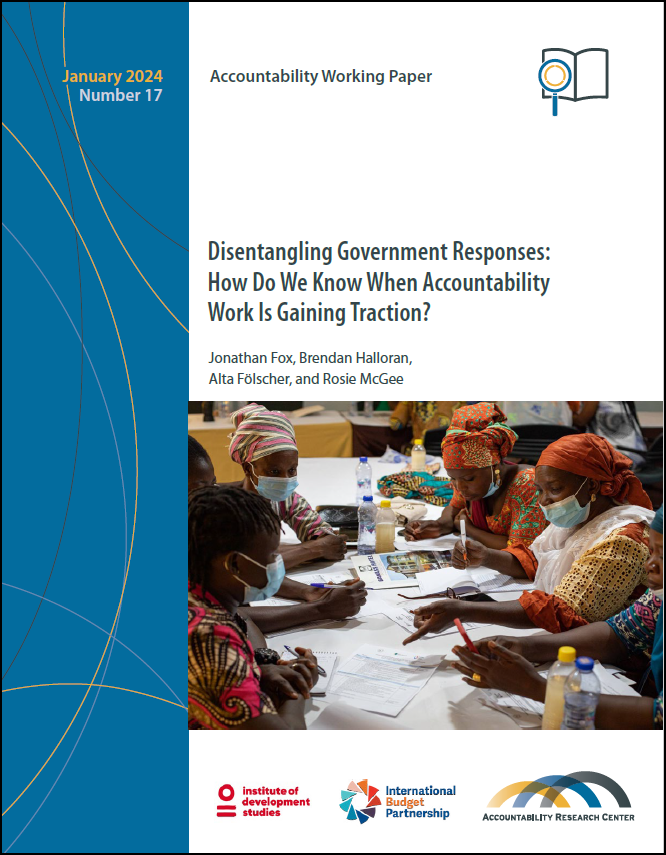
Disentangling Government Responses: How Do We Know When Accountability Work Is Gaining Traction?
Date: January 2024
Author(s): Jonathan Fox, Brendan Halloran, Alta Fölscher, Rosie McGee
Publication type: ARC Accountability Working Paper
Published by: Accountability Research Center
Advocacy for public accountability aims to produce certain reactions from government officials or service providers. However, the reactions can be many and diverse, and it is not always clear to advocates how to interpret them and decide on next steps—whether to intensify efforts or back off; continue the same strategy or make adjustments.
This paper presents a framework to help accountability advocates and practitioners interpret government reactions to their efforts and move forward appropriately. The framework arises from learning and reflection in the context of the International Budget Partnership (IBP)’s Strengthening Public Accountability with Results and Knowledge (SPARK) program. SPARK seeks to bolster the collective agency of marginalized communities and coalitions to advance democratic and equitable fiscal governance systems that channel public resources to services that address the priority needs of these historically excluded groups.
The paper does the following:
- Unpacks the broad umbrella category of government responses to citizen-led accountability initiatives, discerning within it three overlapping categories of responses, responsiveness, and accountable responsiveness (RRA), and pinpointing what distinguishes them.
- Maps out the public financial management (PFM) system as the critical conduit for any public service to progress from non-response through these three categories, reflecting the terrain and priorities of the SPARK program and IBP more broadly.
- Discusses how the RRA framework can be used to take stock of partial or incremental responses and assess whether change is moving towards accountable governance by reference to the SPARK program and other IBP efforts.
The RRA framework supports accountability-claiming practice by facilitating close attention to the actions of and influences on key government stakeholders, careful interpretation of these, and consequential adjustments to advocacy strategies. Its implications for monitoring, evaluating, and learning (MEL) from practice are also significant. MEL in the accountability field has been evolving in line with the thinking and practical challenges behind the development of the RRA framework. The framework adds to a range of emerging approaches that support the application of theories of change, evidence-based adaptive programming, and politically aware systems thinking in the complex task of building accountable responsiveness towards constituencies historically excluded from public goods and services.
Jonathan Fox is a professor of development studies in the School of International Service at American University, where he directs the Accountability Research Center.
Brendan Halloran is the Head of Strategy and Learning at the International Budget Partnership, an international organization that works to strengthen fiscal governance.
Alta Fölscher has almost 20 years’ consultancy experience and particular technical expertise in the institutional arrangements for effective budget and public financial management and governance, aid delivery, and human rights in development. She has undertaken significant evaluation and program review work, including leading major multi-country aid evaluations.
Rosie McGee is a Research Fellow at the Institute of Development Studies, University of Sussex UK, in the Power and Popular Politics cluster. She has conducted extensive applied research and advisory work on the topic of accountable governance, including leading the learning component of the SPARK program (2018–2021).
